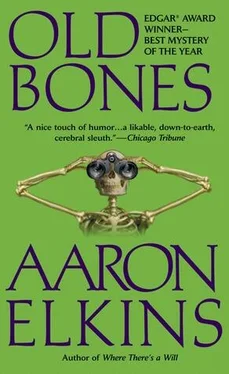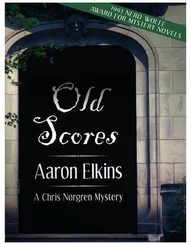Aaron Elkins - Old Bones
Здесь есть возможность читать онлайн «Aaron Elkins - Old Bones» весь текст электронной книги совершенно бесплатно (целиком полную версию без сокращений). В некоторых случаях можно слушать аудио, скачать через торрент в формате fb2 и присутствует краткое содержание. Жанр: Классический детектив, на английском языке. Описание произведения, (предисловие) а так же отзывы посетителей доступны на портале библиотеки ЛибКат.
- Название:Old Bones
- Автор:
- Жанр:
- Год:неизвестен
- ISBN:нет данных
- Рейтинг книги:3 / 5. Голосов: 1
-
Избранное:Добавить в избранное
- Отзывы:
-
Ваша оценка:
- 60
- 1
- 2
- 3
- 4
- 5
Old Bones: краткое содержание, описание и аннотация
Предлагаем к чтению аннотацию, описание, краткое содержание или предисловие (зависит от того, что написал сам автор книги «Old Bones»). Если вы не нашли необходимую информацию о книге — напишите в комментариях, мы постараемся отыскать её.
Old Bones — читать онлайн бесплатно полную книгу (весь текст) целиком
Ниже представлен текст книги, разбитый по страницам. Система сохранения места последней прочитанной страницы, позволяет с удобством читать онлайн бесплатно книгу «Old Bones», без необходимости каждый раз заново искать на чём Вы остановились. Поставьте закладку, и сможете в любой момент перейти на страницу, на которой закончили чтение.
Интервал:
Закладка:
He bowed Mathilde out, went back to the desk and jotted a few more sparse notes on the lined pad on which he had put down a word or two from time to time. Then he turned to the list of names at the front, placed a check mark before Mathilde’s, as he had already done before those of Rene, Beatrice, and the resolutely taciturn Marcel. With a finger to his lips he studied the remaining names, then got up again and called to Fleury.
"Will you have Madame Fougeray come down, please?"
Another formidable woman, Leona Fougeray. Not in Mathilde’s way: Mathilde was imposing the way a cannonball is imposing-heavy, dense, solid. Leona had the formidability of an arrow, or better yet a poison dart-quick, thin, brittle, full of venom. Vivid as a magpie in a black-and-white-striped suit with enormous square shoulders that made her neat, dark head look tiny, there was not even a pretense of the mournful widow about her; no hint of tremor, no tastefully restrained anguish over the fact that her husband’s body had been carted off to the police morgue barely half an hour before. In fact, she had spewed a stream of abuse each time Joly had mentioned Claude.
"No, how do I know what my husband meant?" she said, her Italian accent strong despite a quarter-century in France. "I haven’t paid attention to him for years. Half the time he was raving from wine, the other half he was raving just from natural stupidity."
"Perhaps," Joly said, "but his remarks this time were very specific." He glanced at his notes. "At the reading of the will he claimed that Guillaume had planned a new will, did he not? He said that was the purpose of the council."
She turned down her mouth. "He said, he said. Pipe dreams. How could he know what Guillaume planned? You think Guillaume confided in him? If he did he’d be crazy. For forty years we never heard from him; not once. You know the first time I ever saw the great Guillaume? Last Sunday." She shrugged. "Not such a treat."
"Your husband also said-to you, before Guillaume died-that the others had a surprise coming, that he knew some things they didn’t know."
Her mobile eyebrows went up. "You know a lot."
"You don’t know what he meant? You don’t know the reason for the council?"
Again she grimaced. "I told you, they were pipe dreams. Who knows what Guillaume’s letter meant? But my husband-oh, it was very clear to him. Guillaume, in his old age, was full of remorse for cutting him out of his will back in the Dark Ages. He was going to make us millionaires." She laughed curtly. "Look, is it all right if I smoke?"
With gratitude, Joly approved her request. He lit her American Virginia Slim, then a Gitane for himself, and took a cardboard paperclip container from a drawer to use as an ashtray.
"Madame Fougeray, just why was your husband cut out of the will?"
"Hey, how old do you think I am?" she said with more distress than she’d shown over the murder of her mate not two hours before. "I was born in 1934. Claude robbed me from the cradle. I didn’t marry him until 1952. How could I know what happened at the manoir "-she said the word with derisive affectation-"right after the war?"
"Do you mean he never spoke of it to you?"
"Oh, he spoke of it to me all the time."
Joly wondered sourly if she were mimicking him. "And just what did he say?" he asked, his patience beginning to fray.
"Ah, just that the family turned Guillaume from him for no reason at all-only that they wanted to keep the estate among themselves."
"And do you believe that?"
"Of course I don’t believe it," she said contemptuously. "There’s more to it than that."
"But you don’t know what."
"No, why should I care? I told him we shouldn’t even come here. And now somebody’s killed him for his greed." She nodded to herself, blew out a haze of smoke, and ground out her barely smoked cigarette in the box. "I thank them."
Joly, who had a keen sense of propriety, was offended. "Madame," he said stiffly, "whom can you think of that might have wanted to kill your husband?"
Leona threw back her dark, tight-skinned head and laughed. "If you want to know all the people in the world who hated his guts, you’re going to have some long list." She stared at him hotly. "You can start with me."
Joly took a final pull from his own cigarette and put it neatly out. "Very well, madame," he said equably, "we’ll start with you."
By 11:30, Joly was tired and out of humor. He was getting nowhere, and each person he interviewed seemed more irritating than the one before. This, he knew, came largely from fatigue, but there could be no question that Jules du Rocher was a singularly unappealing young man, fat, pouty, and given to simpering, gossiping, and other disagreeable behaviors.
Joly interrupted him while he was expounding his theory that Ben and Sophie Butts might well have poisoned Claude Fougeray out of fear that he would challenge Guillaume’s will and deprive them of the valuable Rochebonne library. This thesis had been enthusiastically advanced following other helpful ideas pointing to the possible guilt of Claire, Ray, Leona, Marcel, and Beatrice.
"As to the reason Guillaume du Rocher called all of you together," Joly cut in wearily, "I suppose you have no idea."
"Oh, no," Jules replied, readily switching topics. "I know, all right."
Joly looked skeptically at him. "Oh?"
"He was going to sell the manoir to a hotel chain- Swiss, I think, or Swedish-and he wanted to tell the family about the arrangements."
"And how do you alone come to know this, monsieur?"
"He told me on the telephone last week. He said no one else was to know, so I didn’t tell anyone."
Under Joly’s steady gaze, his plump, smooth cheeks colored sullenly. "If you don’t believe me, you can check the telephone records. Well, can’t you?"
Joly nodded.
"And ask Beatrice. She put the call through. She told me he wanted to tell me what it was about. Go ahead and ask her, if you want to. Anyway, why should I-"
"All right," Joly said. "All right." Now that he thought about it, Bonfante, the attorney, had told him that a Swiss hotel concern had been after Guillaume for years to sell the place. He sipped at the coffee Beatrice had brought him ten minutes before; lukewarm then, cold now. "Why only you and no one else?"
Jules shrugged. "It’s the way he wanted it, that’s all. He told me lots of things before anyone else knew about them. I was his favorite, you know."
Joly let this improbability pass. "And why were the Fougerays, who were not his favorites, invited to this particular family council after all this time?"
"That’s just what I’d like to know," Jules said, and laughed as if he’d made a joke. He looked meaningfully at the small plate of butter cookies Beatrice had brought along with Joly’s coffee.
"Please," Joly said, gesturing at the untouched cookies. "Now, these‘arrangements’: What sort of arrangements?"
Jules stuffed two cookies into his mouth one after the other, tamping them in like tobacco into a pipe. He licked the residue luxuriously from his thumb and forefinger (leaving them glistening, Joly noted with displeasure) and sighed like a man who’d just gotten a desperately needed fix. "Something about investing the proceeds, or capitalizing the profits, or some such thing," he said, chewing. "I’m afraid I didn’t listen very carefully. I don’t have a mind for finance, you know. Poor Father will never understand it, but I live for the arts." He dropped his eyes modestly. "I’m a novelist. I’m working on a book now."
"Ah," said Joly, not caring to encourage this subject.
"It deals with the struggle of a banker’s son to actualize his spiritual potential in a world of crass materialism and greed," Jules volunteered.
Joly studied him for some sign of joking, but failed to find any. Jules’ eyes, which the young man seemed able to keep from the remaining two cookies only with difficulty, fell on them with a look of open longing.
Читать дальшеИнтервал:
Закладка:
Похожие книги на «Old Bones»
Представляем Вашему вниманию похожие книги на «Old Bones» списком для выбора. Мы отобрали схожую по названию и смыслу литературу в надежде предоставить читателям больше вариантов отыскать новые, интересные, ещё непрочитанные произведения.
Обсуждение, отзывы о книге «Old Bones» и просто собственные мнения читателей. Оставьте ваши комментарии, напишите, что Вы думаете о произведении, его смысле или главных героях. Укажите что конкретно понравилось, а что нет, и почему Вы так считаете.












